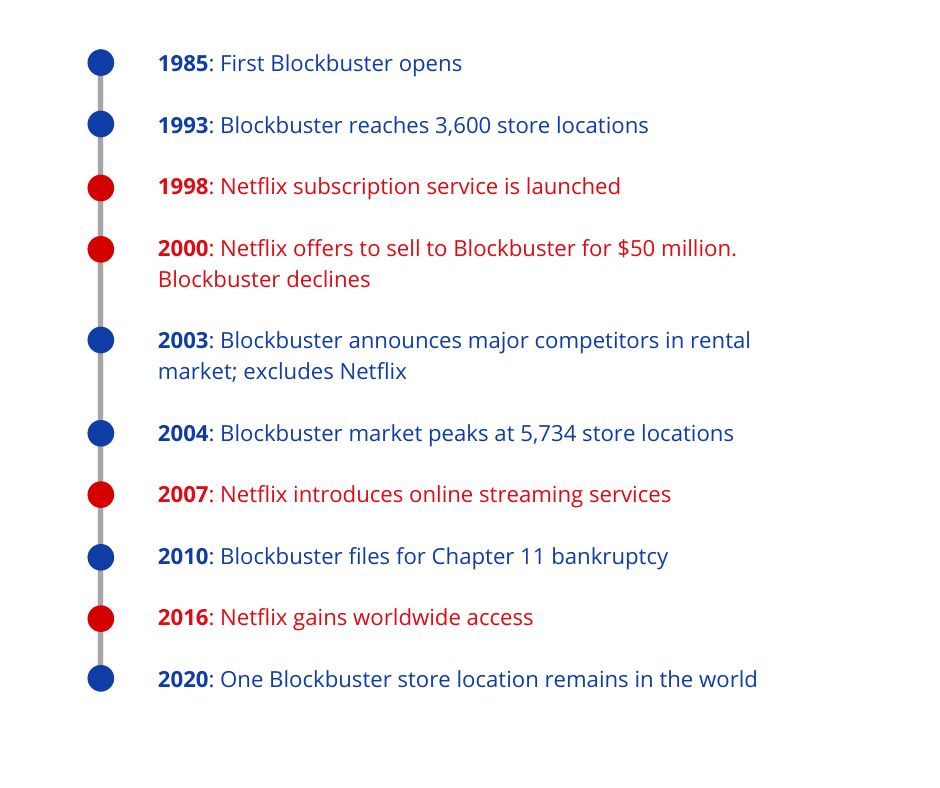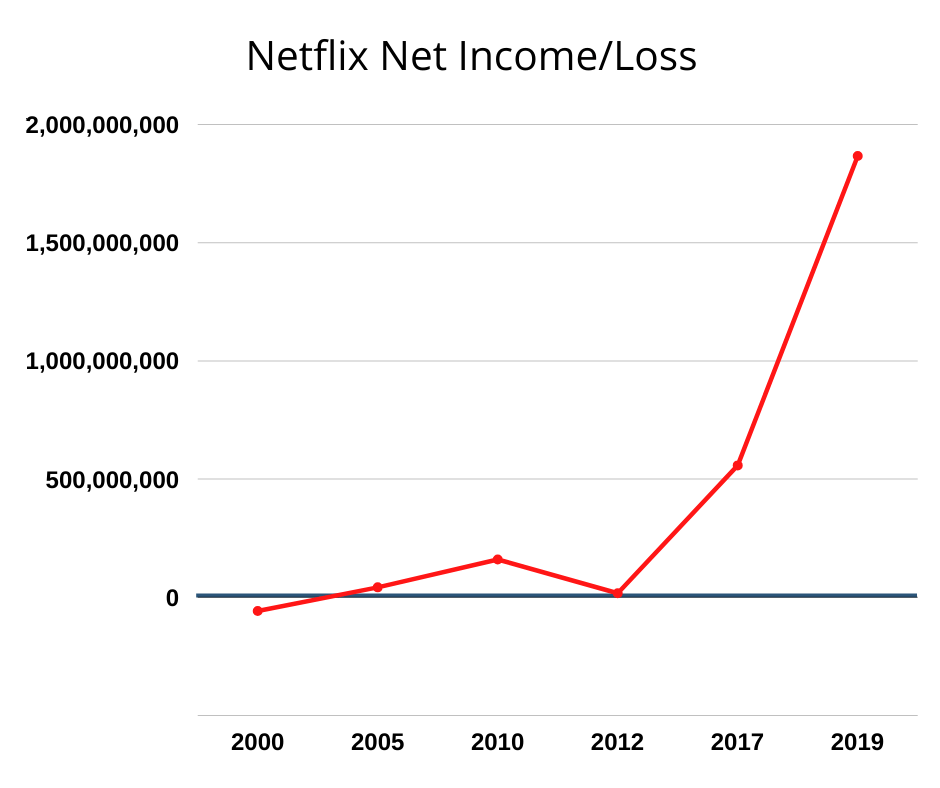Blockbuster, Netflix, and the Funeral Industry
Peyton Walbeck • July 28, 2020
What happened to Blockbuster? What did Netflix do right? And how can we learn from this in the funeral industry?

Blockbuster
If you were alive in the 1980s, then you remember the beginnings of Blockbuster video. Blockbuster was born at a time when movie rental services were less than ten years old. Absurdly high prices for video purchases had created high demand for lower-cost video rentals. As a result, video rental stores spread like wildfire across the United States. Blockbuster didn’t just grow, it flourished. Within eight years, they had grown their store footprint to 3,600 locations across the US. The brand had become a household name and was embedding itself in the culture of everyday Americans.
Unfortunately, during this time of prosperity, Blockbuster became out of touch with changing consumer preferences. Consumers hated late fees, wanted a bigger selection, and didn’t want to drive to and from the store. Blockbuster ignored these signs and instead trusted in their business model which had already been proven successful. This became an invitation for competitors to enter the market, like a small startup called Netflix.
Netflix
Netflix embraced the DVD revolution by implementing a mail-based subscription service. While Blockbuster watched this small company slowly gain market share with DVD mailings, Netflix was also developing an online streaming service that would eventually fully integrate technology into their company model. Soon after turning into a multi-million dollar company, Netflix executives offered to allow Blockbuster to purchase the company. Blockbuster declined the offer, later referring to Netflix as a “very small niche business”.
By the time Blockbuster realized that consumers preferred online streaming, it was too late. Netflix had already created a completely personalized and convenient process for streaming movies. Their platform allowed for new movies to be suggested to each user based on their interests, late fees were nonexistent, monthly payments were automatic and cheap, and families could browse options from the comfort of their own home.

Funeral Industry
Now how exactly does this relate to us in our funeral homes and cemeteries? The funeral industry as a whole has been slower to fully embrace the tech boom. The personal level at which we do business has often seemed at odds with technology. Our customers aren’t just customers, they’re families going through a very difficult time. Where does technology fit into our service? And what happens if we are too late in adopting it?
While the funeral industry is by no means a tech-heavy industry yet, it is heading in that direction. We’ve all seen the booths of tech companies at NFDA and ICCFA that look a little out of place among the traditional services we’ve seen for decades. As consumer preferences change with innovative technology moving forward, companies can either adapt themselves, or watch their competitors adapt and capture the market share.
Blockbuster wasn’t taken down by Netflix. Blockbuster was taken down by their own failure to respond to the changing preferences of the consumer.
What are the current preferences of families in the funeral industry? Here are a few I believe are trending:
- Communication through text message
- Online pre-planning
- Online purchases
- Video content
- Online reviews
- Transparent pricing
- Social media
Would you add or remove any from this list? Where is your funeral home or cemetery at in adapting to these preferences?
The secret sauce we look for in the funeral industry is this: implementing technology into our funeral homes and cemeteries that create more personal experience, trust, and simplicity for the families we serve. By selecting innovative services
that use this key ingredient, you can ride the wave of innovation and simultaneously create a deeper personal connection with your families.
Funeral Home Articles

If there's one thing we've learned in 2020, it's that it's difficult to predict the future, and there will all be surprises that lie ahead. Businesses and individuals need to stay agile and adaptable to be ready for whatever life throws at them. 2020 has been a challenging year for the funeral profession and others as well. Still, we've seen that those funeral homes and funeral professionals who have focused on making their consumer experience as comforting and easy as possible are those that are winning. At Domani, we exist to help funeral homes help their families have a better experience. Through the power of text messaging, we follow up with families and give them the support and resources they need following a loss. That great experience then leads to a positive online review and helps others looking for a positive experience to find that funeral home. It's a virtuous cycle that helps grow a funeral home's at-need business. When it comes to preneed, the same principle holds. If funeral homes can provide the experience a family is looking for, that will be the funeral home that wins. During 2020, our preneed appointment setting team has found great success in scheduling remote appointments. Funeral homes that have been willing to adapt and find new ways to do business have grown even during difficult circumstances. We firmly believe that technology will help us as a funeral profession provide those better experiences for families, but simply using technology for technology's sake is not the answer. We need to leverage technology to help provide personal, engaging experiences with families. We shouldn't use technology as a crutch or an excuse. It's another way to help the ones we serve and provide them the support they need during a difficult time. As we approach the end of the year and look forward to 2020, take some time to think about how your funeral home is providing meaningful experiences for families and how/what you can do to improve that in the coming year. If you're interested in learning more about Domanicare or Domani Appoinment Setting, please schedule a demo by clicking the link below.

By far the most effective way to create a sense of loyalty to your funeral home is to perform an exceptional service for that family. However, there’s more that you can be doing to establish credibility with families. Here’s three easy steps on how to develop loyalty to your company and ensure your customers come back for your services when a loved one passes.

The vast majority of people in the US and Canada use smartphones. Almost everyone has a smartphone nowadays. Remember when the first “smartphone” came out in 1992 and cell phones like the BlackBerry and iPhone were considered luxuries when they were first created? Now it’s a common sight to see an iPhone. Most funeral homes and cemeteries haven’t even scratched the surface of text-based aftercare, but with 80% of the U.S. population owning a smartphone, and that number expected to rapidly grow.